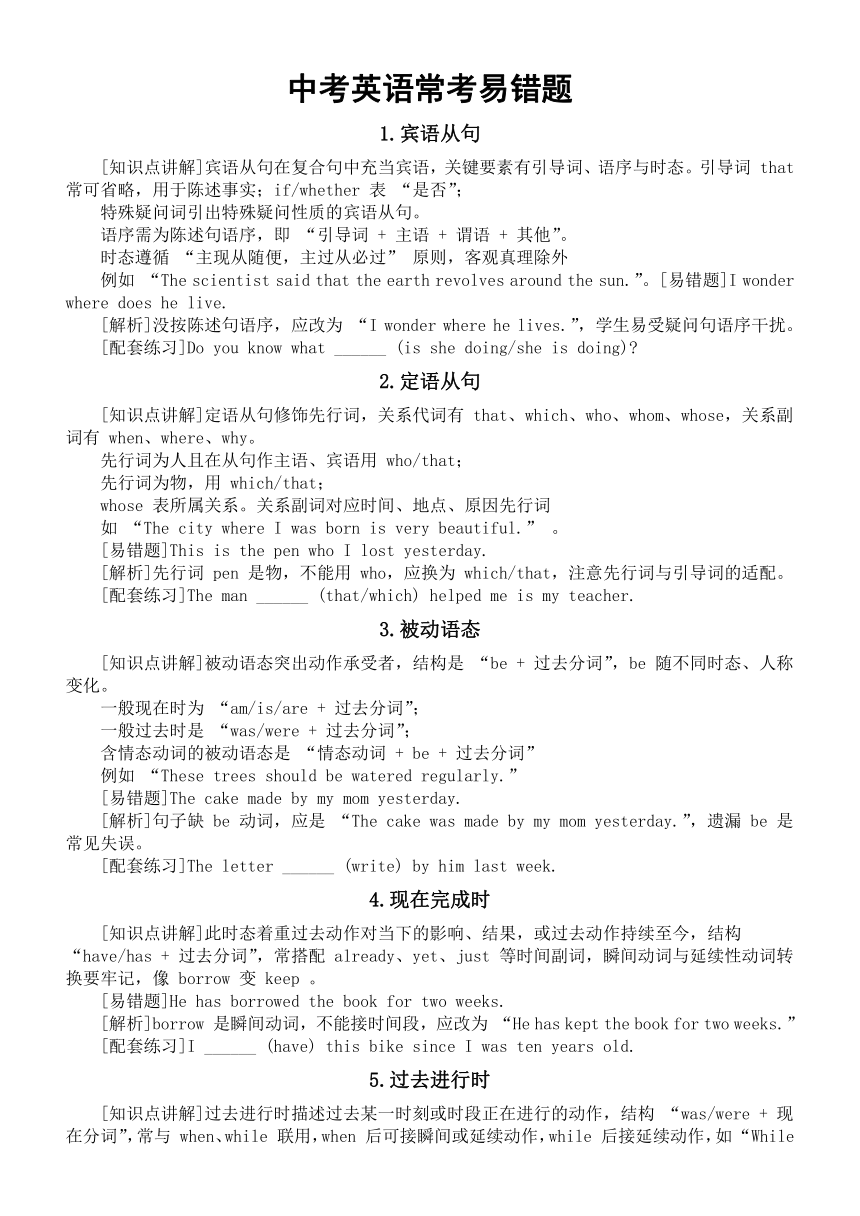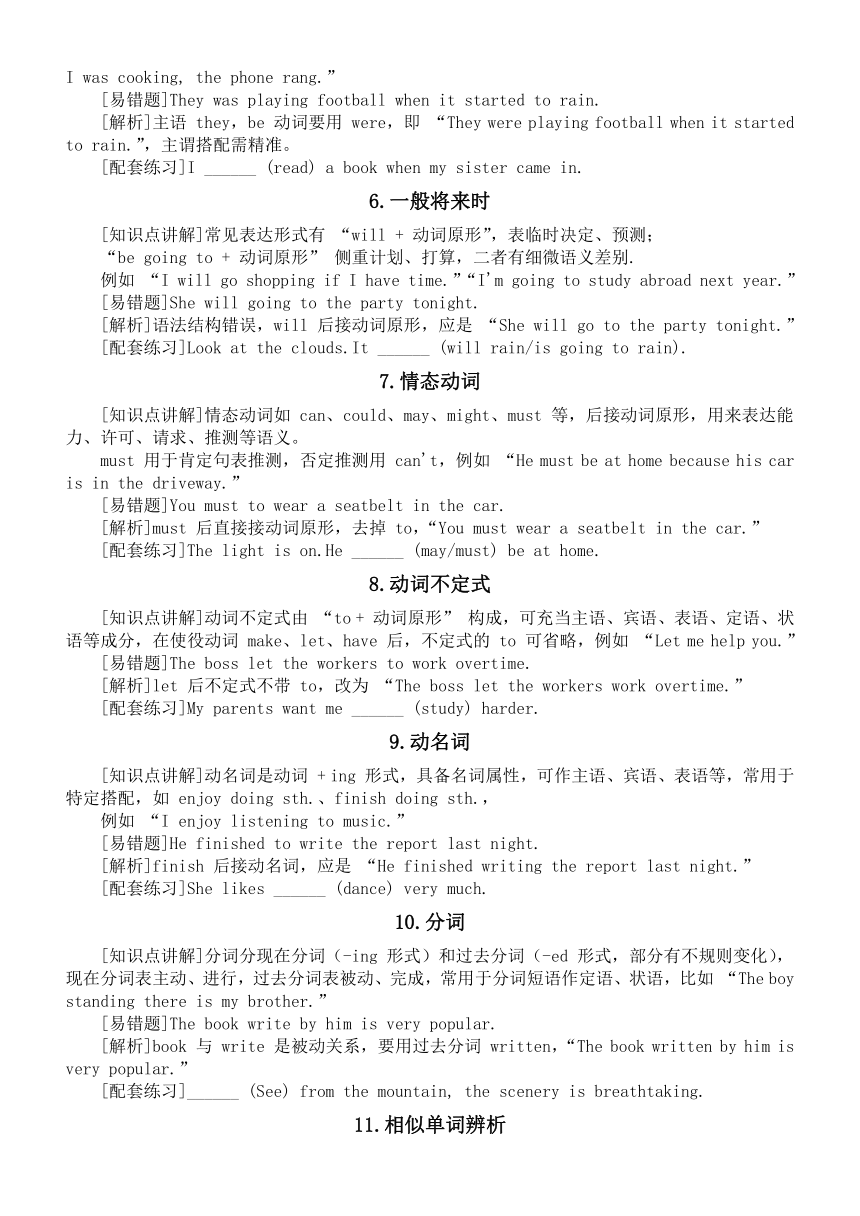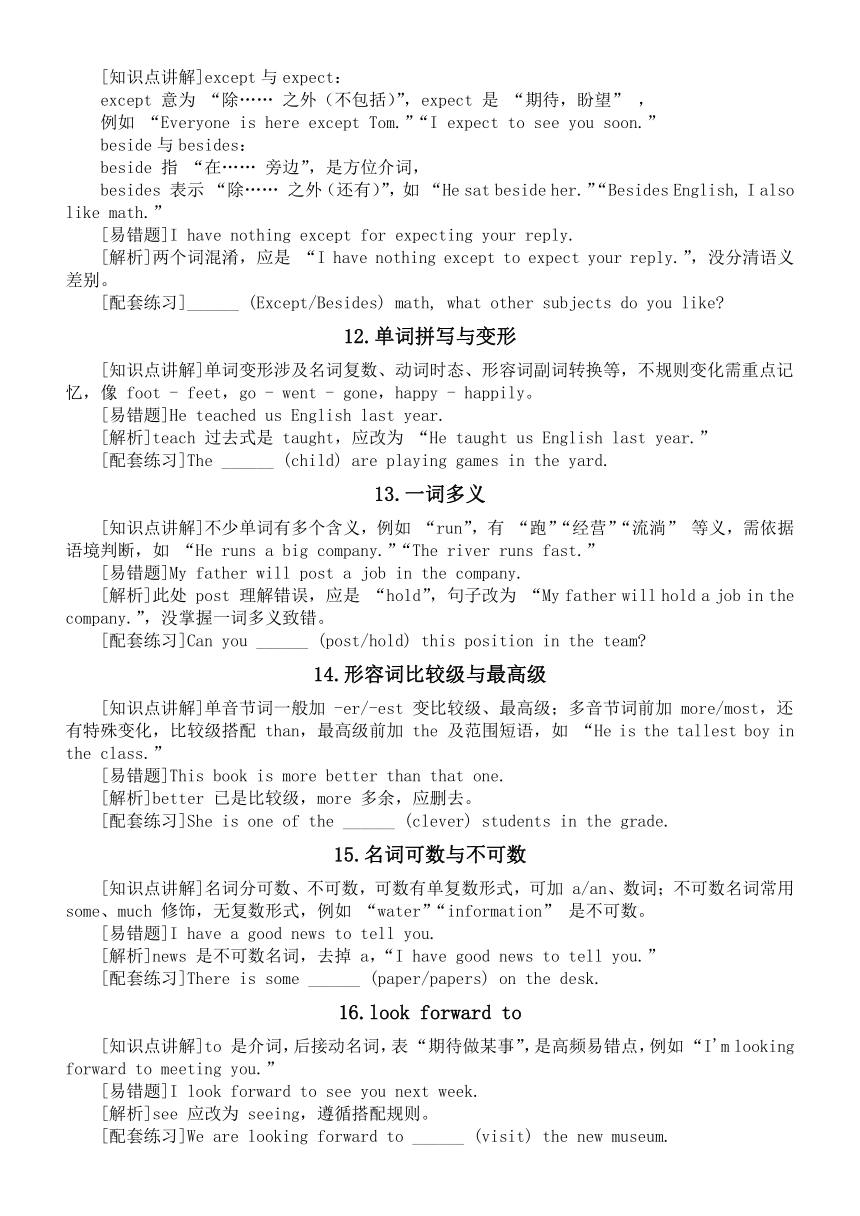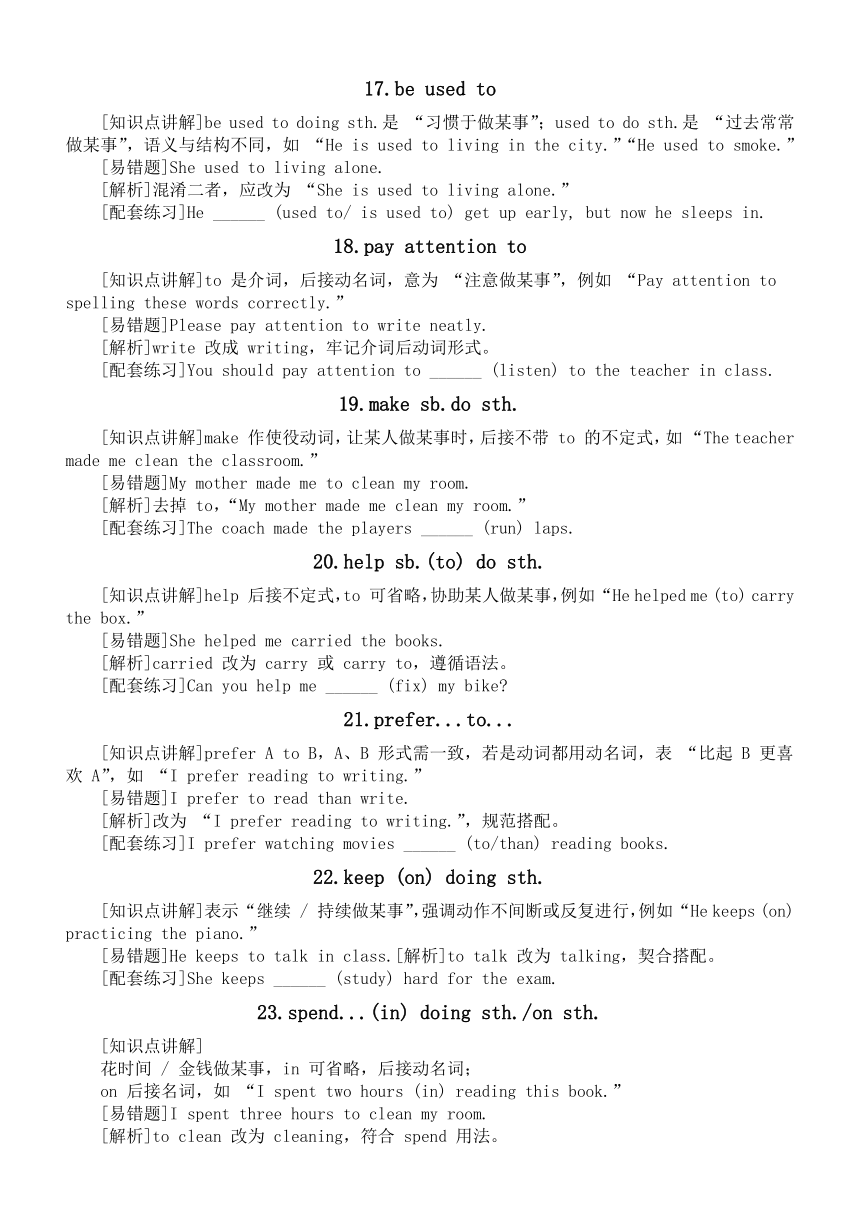2025届人教版中考英语常考易错题讲解(共44道)
文档属性
| 名称 | 2025届人教版中考英语常考易错题讲解(共44道) |  | |
| 格式 | docx | ||
| 文件大小 | 29.5KB | ||
| 资源类型 | 教案 | ||
| 版本资源 | 人教版 | ||
| 科目 | 英语 | ||
| 更新时间 | 2025-01-12 10:55:30 | ||
图片预览




文档简介
中考英语常考易错题
1.宾语从句
[知识点讲解]宾语从句在复合句中充当宾语,关键要素有引导词、语序与时态。引导词 that 常可省略,用于陈述事实;if/whether 表 “是否”;
特殊疑问词引出特殊疑问性质的宾语从句。
语序需为陈述句语序,即 “引导词 + 主语 + 谓语 + 其他”。
时态遵循 “主现从随便,主过从必过” 原则,客观真理除外
例如 “The scientist said that the earth revolves around the sun.”。[易错题]I wonder where does he live.
[解析]没按陈述句语序,应改为 “I wonder where he lives.”,学生易受疑问句语序干扰。
[配套练习]Do you know what ______ (is she doing/she is doing)
2.定语从句
[知识点讲解]定语从句修饰先行词,关系代词有 that、which、who、whom、whose,关系副词有 when、where、why。
先行词为人且在从句作主语、宾语用 who/that;
先行词为物,用 which/that;
whose 表所属关系。关系副词对应时间、地点、原因先行词
如 “The city where I was born is very beautiful.” 。
[易错题]This is the pen who I lost yesterday.
[解析]先行词 pen 是物,不能用 who,应换为 which/that,注意先行词与引导词的适配。
[配套练习]The man ______ (that/which) helped me is my teacher.
3.被动语态
[知识点讲解]被动语态突出动作承受者,结构是 “be + 过去分词”,be 随不同时态、人称变化。
一般现在时为 “am/is/are + 过去分词”;
一般过去时是 “was/were + 过去分词”;
含情态动词的被动语态是 “情态动词 + be + 过去分词”
例如 “These trees should be watered regularly.”
[易错题]The cake made by my mom yesterday.
[解析]句子缺 be 动词,应是 “The cake was made by my mom yesterday.”,遗漏 be 是常见失误。
[配套练习]The letter ______ (write) by him last week.
4.现在完成时
[知识点讲解]此时态着重过去动作对当下的影响、结果,或过去动作持续至今,结构 “have/has + 过去分词”,常搭配 already、yet、just 等时间副词,瞬间动词与延续性动词转换要牢记,像 borrow 变 keep 。
[易错题]He has borrowed the book for two weeks.
[解析]borrow 是瞬间动词,不能接时间段,应改为 “He has kept the book for two weeks.”
[配套练习]I ______ (have) this bike since I was ten years old.
5.过去进行时
[知识点讲解]过去进行时描述过去某一时刻或时段正在进行的动作,结构 “was/were + 现在分词”,常与 when、while 联用,when 后可接瞬间或延续动作,while 后接延续动作,如 “While I was cooking, the phone rang.”
[易错题]They was playing football when it started to rain.
[解析]主语 they,be 动词要用 were,即 “They were playing football when it started to rain.”,主谓搭配需精准。
[配套练习]I ______ (read) a book when my sister came in.
6.一般将来时
[知识点讲解]常见表达形式有 “will + 动词原形”,表临时决定、预测;
“be going to + 动词原形” 侧重计划、打算,二者有细微语义差别.
例如 “I will go shopping if I have time.”“I'm going to study abroad next year.”
[易错题]She will going to the party tonight.
[解析]语法结构错误,will 后接动词原形,应是 “She will go to the party tonight.”
[配套练习]Look at the clouds.It ______ (will rain/is going to rain).
7.情态动词
[知识点讲解]情态动词如 can、could、may、might、must 等,后接动词原形,用来表达能力、许可、请求、推测等语义。
must 用于肯定句表推测,否定推测用 can't,例如 “He must be at home because his car is in the driveway.”
[易错题]You must to wear a seatbelt in the car.
[解析]must 后直接接动词原形,去掉 to,“You must wear a seatbelt in the car.”
[配套练习]The light is on.He ______ (may/must) be at home.
8.动词不定式
[知识点讲解]动词不定式由 “to + 动词原形” 构成,可充当主语、宾语、表语、定语、状语等成分,在使役动词 make、let、have 后,不定式的 to 可省略,例如 “Let me help you.”
[易错题]The boss let the workers to work overtime.
[解析]let 后不定式不带 to,改为 “The boss let the workers work overtime.”
[配套练习]My parents want me ______ (study) harder.
9.动名词
[知识点讲解]动名词是动词 + ing 形式,具备名词属性,可作主语、宾语、表语等,常用于特定搭配,如 enjoy doing sth.、finish doing sth.,
例如 “I enjoy listening to music.”
[易错题]He finished to write the report last night.
[解析]finish 后接动名词,应是 “He finished writing the report last night.”
[配套练习]She likes ______ (dance) very much.
10.分词
[知识点讲解]分词分现在分词(-ing 形式)和过去分词(-ed 形式,部分有不规则变化),现在分词表主动、进行,过去分词表被动、完成,常用于分词短语作定语、状语,比如 “The boy standing there is my brother.”
[易错题]The book write by him is very popular.
[解析]book 与 write 是被动关系,要用过去分词 written,“The book written by him is very popular.”
[配套练习]______ (See) from the mountain, the scenery is breathtaking.
11.相似单词辨析
[知识点讲解]except与expect:
except 意为 “除…… 之外(不包括)”,expect 是 “期待,盼望” ,
例如 “Everyone is here except Tom.”“I expect to see you soon.”
beside与besides:
beside 指 “在…… 旁边”,是方位介词,
besides 表示 “除…… 之外(还有)”,如 “He sat beside her.”“Besides English, I also like math.”
[易错题]I have nothing except for expecting your reply.
[解析]两个词混淆,应是 “I have nothing except to expect your reply.”,没分清语义差别。
[配套练习]______ (Except/Besides) math, what other subjects do you like
12.单词拼写与变形
[知识点讲解]单词变形涉及名词复数、动词时态、形容词副词转换等,不规则变化需重点记忆,像 foot - feet,go - went - gone,happy - happily。
[易错题]He teached us English last year.
[解析]teach 过去式是 taught,应改为 “He taught us English last year.”
[配套练习]The ______ (child) are playing games in the yard.
13.一词多义
[知识点讲解]不少单词有多个含义,例如 “run”,有 “跑”“经营”“流淌” 等义,需依据语境判断,如 “He runs a big company.”“The river runs fast.”
[易错题]My father will post a job in the company.
[解析]此处 post 理解错误,应是 “hold”,句子改为 “My father will hold a job in the company.”,没掌握一词多义致错。
[配套练习]Can you ______ (post/hold) this position in the team
14.形容词比较级与最高级
[知识点讲解]单音节词一般加 -er/-est 变比较级、最高级;多音节词前加 more/most,还有特殊变化,比较级搭配 than,最高级前加 the 及范围短语,如 “He is the tallest boy in the class.”
[易错题]This book is more better than that one.
[解析]better 已是比较级,more 多余,应删去。
[配套练习]She is one of the ______ (clever) students in the grade.
15.名词可数与不可数
[知识点讲解]名词分可数、不可数,可数有单复数形式,可加 a/an、数词;不可数名词常用 some、much 修饰,无复数形式,例如 “water”“information” 是不可数。
[易错题]I have a good news to tell you.
[解析]news 是不可数名词,去掉 a,“I have good news to tell you.”
[配套练习]There is some ______ (paper/papers) on the desk.
16.look forward to
[知识点讲解]to 是介词,后接动名词,表 “期待做某事”,是高频易错点,例如 “I'm looking forward to meeting you.”
[易错题]I look forward to see you next week.
[解析]see 应改为 seeing,遵循搭配规则。
[配套练习]We are looking forward to ______ (visit) the new museum.
17.be used to
[知识点讲解]be used to doing sth.是 “习惯于做某事”;used to do sth.是 “过去常常做某事”,语义与结构不同,如 “He is used to living in the city.”“He used to smoke.”
[易错题]She used to living alone.
[解析]混淆二者,应改为 “She is used to living alone.”
[配套练习]He ______ (used to/ is used to) get up early, but now he sleeps in.
18.pay attention to
[知识点讲解]to 是介词,后接动名词,意为 “注意做某事”,例如 “Pay attention to spelling these words correctly.”
[易错题]Please pay attention to write neatly.
[解析]write 改成 writing,牢记介词后动词形式。
[配套练习]You should pay attention to ______ (listen) to the teacher in class.
19.make sb.do sth.
[知识点讲解]make 作使役动词,让某人做某事时,后接不带 to 的不定式,如 “The teacher made me clean the classroom.”
[易错题]My mother made me to clean my room.
[解析]去掉 to,“My mother made me clean my room.”
[配套练习]The coach made the players ______ (run) laps.
20.help sb.(to) do sth.
[知识点讲解]help 后接不定式,to 可省略,协助某人做某事,例如 “He helped me (to) carry the box.”
[易错题]She helped me carried the books.
[解析]carried 改为 carry 或 carry to,遵循语法。
[配套练习]Can you help me ______ (fix) my bike
21.prefer...to...
[知识点讲解]prefer A to B,A、B 形式需一致,若是动词都用动名词,表 “比起 B 更喜欢 A”,如 “I prefer reading to writing.”
[易错题]I prefer to read than write.
[解析]改为 “I prefer reading to writing.”,规范搭配。
[配套练习]I prefer watching movies ______ (to/than) reading books.
22.keep (on) doing sth.
[知识点讲解]表示 “继续 / 持续做某事”,强调动作不间断或反复进行,例如 “He keeps (on) practicing the piano.”
[易错题]He keeps to talk in class.[解析]to talk 改为 talking,契合搭配。
[配套练习]She keeps ______ (study) hard for the exam.
23.spend...(in) doing sth./on sth.
[知识点讲解]
花时间 / 金钱做某事,in 可省略,后接动名词;
on 后接名词,如 “I spent two hours (in) reading this book.”
[易错题]I spent three hours to clean my room.
[解析]to clean 改为 cleaning,符合 spend 用法。
[配套练习]He spent a lot of money ______ (buy) a new bike.
24.日常问候与回应
[知识点讲解]日常问候回复要礼貌规范,“How are you ” 对应 “I'm fine, thank you.And you ”,维持交流礼貌氛围。
[易错题]A: How are you B: Just so so, you know.
[解析]回应稍显随意,换为标准回答更合适,保证交流礼仪。
[配套练习]A: Nice to meet you.B: ______
25.请求许可
[知识点讲解]用 “Could you please... ” 礼貌请求,回应有肯定、委婉拒绝模式,肯定用 “Sure, I'd be glad to.”,拒绝用 “I'm sorry, but...”
[易错题]A: Could you please pass the salt B: Yes, I could.
[解析]回应生硬,改为恰当表达,契合语境。
[配套练习]A: Could you lend me your book B: ______
26.提建议
[易错题]A: I'm bored.B: What about go to the park
[解析]go 改为 going,遵循语法。
[配套练习]A: I don't know what to do this weekend.B: ______ (用 Why not 提建议)
[知识点讲解]“How about... ”“What about... ” 接名词、动名词;“Why not... ” 接动词原形提建议,如 “How about going for a walk ”“Why not have a party ”
27.表达喜好
[知识点讲解]用特定句型表喜好,如 “I like...best”“My favorite...is...”,例如 “My favorite color is blue.”
[易错题]My most favorite subject is English.
[解析]favorite 已有 “最” 意,删去 most。
[配套练习]______ (What/Which) is your favorite sport
28.致歉与回应
[知识点讲解]“I'm sorry.” 回应常用 “It's okay/That's all right.” 表示没关系,体现礼貌态度。
[易错题]A: I'm sorry for being late.B: No problem.
[解析]回应稍随意,换更合适表达,凸显礼貌。
[配套练习]A: I'm sorry I broke your pen.B: ______
29.句子结构不完整
[知识点讲解]完整句子需有主谓结构,缺之则表意不明,写作时常因疏忽遗漏,例如 “Running in the park.” 不是完整句,需补充主语。
[易错题]Go to school very early.
[解析]缺主语,补上 “I” 等主语,变为 “I go to school very early.”
[配套练习]______ (Go/Going) to school on time is important.
30.词性误用
[知识点讲解]形容词修饰名词,副词修饰动词、形容词等,要区分使用,如 “quick”(形)修饰 “run”(动)要变 “quickly”。
[易错题]He runs very quick.
[解析]quick 应改为 quickly,遵循修饰规则。
[配套练习]The singer sings ______ (beautiful/beautifully).
31.人称代词与物主代词混淆
[知识点讲解]人称代词主格作主语,宾格作宾语,物主代词分形容、名词性,各有其用途,例如 “I” 主格,“me” 宾格,“my” 形容性,“mine” 名词性。
[易错题]This is my book.It's me.
[解析]me 应是 mine,正确表意。
[配套练习]______ (My/Mine) bag is heavier than yours.
32.单词大小写错误
[知识点讲解]在英语书写规范里,句子的首字母必须大写,专有名词也要大写首字母,这包含人名、地名、组织机构名、星期、月份、节日、书籍报刊名、影视歌名等。
标题写作时,实词首字母大写,虚词(冠词、介词、连词)通常小写,但位于句首的虚词要大写 。
[易错题]my favorite book is harry potter.
[解析]“Harry Potter” 是专有名词,需将首字母大写,应改为 “My favorite book is Harry Potter.”。
再比如写标题 “the adventures of tom sawyer”,应规范写成 “The Adventures of Tom Sawyer”,遵循标题大小写规则。
[配套练习]correct the capitalization mistakes: i went to beijing last month and visited the great wall.
33.中式英语表达
[知识点讲解]受汉语思维习惯影响,学生容易写出逐字翻译的中式英语句子。英语有自身的语法规则与表达习惯,像 “我非常喜欢它”,不能直译为 “I very like it”,而应是 “I like it very much” 。
[易错题]I every day go to school by bike.
[解析]应调整语序为 “I go to school by bike every day.”,要遵循英语中时间状语通常放在句末的习惯,摆脱汉语语序的干扰。
[配套练习]He ______ (usually is/is usually) late for class.
34.时态混乱
[知识点讲解]写作要依据事件发生的时间脉络选用合适时态,一旦混淆,句子语义就会含糊不清。比如描述过去发生的事要用一般过去时,阐述习惯、真理要用一般现在时 。
[易错题]She tell me a story yesterday.
[解析]yesterday 表明是过去时态,tell 要变为过去式 told,即 “She told me a story yesterday.”
[配套练习]I ______ (write) a letter to my friend last night.
35.主谓一致错误
[知识点讲解]主语的单复数形式必须和谓语动词形式相匹配。
复数主语搭配复数谓语动词,单数主语搭配单数谓语动词;
特殊结构,如 “with”“along with” 连接的并列主语,谓语动词与前面的主语保持一致 。
[易错题]The boy with his friends play basketball every day.
[解析]主语核心是 the boy,为单数,play 应改为 plays,即 “The boy with his friends plays basketball every day.”
[配套练习]My mother, together with my sisters, ______ (go) shopping on weekends.
36.重复累赘
[知识点讲解]英语追求简洁性,写作中避免使用多余、重复的词汇或表达。例如 “return back” 中,return 本身就有 “回来” 意思,back 就多余了 。
[易错题]Please repeat it again.
[解析]repeat 已有 “重复” 之意,again 多余,应删去,改为 “Please repeat it.”
[配套练习]You can connect together these two parts.(找出并改正重复累赘处)
37.比较级和最高级误用
[知识点讲解]比较级用于两者之间对比,常搭配 than;
最高级用于三者及以上的比较,前面要加 the。
学生容易在比较对象数量不明时,选错形式 。
[易错题]This is the more interesting book in the store.
[解析]in the store 表示范围不止两本书,要用最高级,改为 “This is the most interesting book in the store.”
[配套练习]Of the two apples, this one is ______ (big).
38.非谓语动词混淆
[知识点讲解]动词不定式、动名词、分词都属于非谓语动词,功能各异。
不定式常表目的、将来;动名词侧重名词性的动作;现在分词表主动、进行,过去分词表被动、完成,使用场景需分清 。
[易错题]To see is believing.
[解析]前后形式不一致,应统一为动名词,改为 “Seeing is believing.”
[配套练习]______ (Study) hard, you will pass the exam.
39.冠词误用
[知识点讲解]冠词分为不定冠词 a/an 和定冠词 the。a/an 用于泛指单个可数事物,a 用在辅音音素开头单词前,an 用于元音音素开头单词前;the 用于特指,或独一无二的事物、上文提到过的事物 。
[易错题]I have an apple.Apple is red.
[解析]第二次提到 apple,是特指前面提到的那个,要用 the,改为 “I have an apple.The apple is red.”
[配套练习]I saw ______ (a/the) boy in the park.The boy was flying a kite.
40.连接词误用
[知识点讲解]连接词用来衔接句子、段落,使文章逻辑连贯。and 表并列、顺承;but 表转折;because 表因果等,用错会导致语义不通 。
[易错题]I like reading books, because I don't like watching TV.
[解析]前后语义是转折关系,because 应改为 but,即 “I like reading books, but I don't like watching TV.”
[配套练习]He is very tired, ______ (and/but) he still keeps working.
41.数字听辨
[知识点讲解]听力中数字信息繁多,像日期、时间、价格、电话号码等。
要注意十几(-teen)和几十(-ty)的发音区别,以及分数、小数的表达。
例如,thirteen 和 thirty 发音相近,容易混淆;分数中分子用基数词,分母用序数词,若分子大于 1,分母要加 s 。
[易错题]听力原文说 “The meeting will start at 3:15.”,学生误听成 “The meeting will start at 3:50.”
[解析]“fifteen” 尾音是 / f f ti n/ ,“fifty” 尾音是 / f fti/,学生可能没仔细区分发音细节。多听多练,熟悉常见数字的读音韵律,可减少这类错误。
[配套练习]听一段对话,回答问题:
What's the price of the shirt A.$19.B.$90.
42.同音异形词
[知识点讲解]英语里有不少同音异形词,如 write 和 right,hear 和 here。在听力语境里,仅靠读音无法精准判断词义,要结合上下文来确定 。
[易错题]听力中提到 “I will write to you soon.”,学生写成了 “I will right to you soon.”
[解析]right 作动词意为 “纠正;使恢复正常”,不符合语境,write 才是 “写信” 的意思。平时积累同音异形词,留意其常见搭配与用法,听时联系前后文推测。
[配套练习]听句子,选出你听到的单词:A.son B.sun 。
句子为:The ______ shines brightly today.
43.弱读与连读
[知识点讲解]英语口语中,为了语流顺畅,会有弱读、连读现象。
弱读的词发音轻、短,像冠词、介词、连词;连读则是前一个词尾音与后一个词首音自然衔接,这都会增加听力理解难度 。
[易错题]听力原文说 “put it on”,学生听成了 “put ton”,没识别出连读。
[解析]it 的 /t/ 音和 on 的 / n / 音连读,听起来像是 / p t t n/,熟悉常见连读规则,多听原声材料适应,才能破解难题。
[配套练习]听短语,判断是否有连读现象:
A.pick up B.come in
44.关键词遗漏
[知识点讲解]听力内容紧凑,稍不留意就会遗漏关键信息词,如否定词 not,转折词 but,这些词能彻底改变句子意思 。
[易错题]听力原文说 “He is not happy with the result.”,学生只听到 “He is happy with the result.”
[解析]遗漏 not,语义全反。
要训练专注力,养成边听边标记关键词的习惯,尤其是那些改变语义走向的词。
[配套练习]听一段短文,判断句子正误:
The man likes the new plan.(原文中有明确提到男人不喜欢新计划)
1.宾语从句
[知识点讲解]宾语从句在复合句中充当宾语,关键要素有引导词、语序与时态。引导词 that 常可省略,用于陈述事实;if/whether 表 “是否”;
特殊疑问词引出特殊疑问性质的宾语从句。
语序需为陈述句语序,即 “引导词 + 主语 + 谓语 + 其他”。
时态遵循 “主现从随便,主过从必过” 原则,客观真理除外
例如 “The scientist said that the earth revolves around the sun.”。[易错题]I wonder where does he live.
[解析]没按陈述句语序,应改为 “I wonder where he lives.”,学生易受疑问句语序干扰。
[配套练习]Do you know what ______ (is she doing/she is doing)
2.定语从句
[知识点讲解]定语从句修饰先行词,关系代词有 that、which、who、whom、whose,关系副词有 when、where、why。
先行词为人且在从句作主语、宾语用 who/that;
先行词为物,用 which/that;
whose 表所属关系。关系副词对应时间、地点、原因先行词
如 “The city where I was born is very beautiful.” 。
[易错题]This is the pen who I lost yesterday.
[解析]先行词 pen 是物,不能用 who,应换为 which/that,注意先行词与引导词的适配。
[配套练习]The man ______ (that/which) helped me is my teacher.
3.被动语态
[知识点讲解]被动语态突出动作承受者,结构是 “be + 过去分词”,be 随不同时态、人称变化。
一般现在时为 “am/is/are + 过去分词”;
一般过去时是 “was/were + 过去分词”;
含情态动词的被动语态是 “情态动词 + be + 过去分词”
例如 “These trees should be watered regularly.”
[易错题]The cake made by my mom yesterday.
[解析]句子缺 be 动词,应是 “The cake was made by my mom yesterday.”,遗漏 be 是常见失误。
[配套练习]The letter ______ (write) by him last week.
4.现在完成时
[知识点讲解]此时态着重过去动作对当下的影响、结果,或过去动作持续至今,结构 “have/has + 过去分词”,常搭配 already、yet、just 等时间副词,瞬间动词与延续性动词转换要牢记,像 borrow 变 keep 。
[易错题]He has borrowed the book for two weeks.
[解析]borrow 是瞬间动词,不能接时间段,应改为 “He has kept the book for two weeks.”
[配套练习]I ______ (have) this bike since I was ten years old.
5.过去进行时
[知识点讲解]过去进行时描述过去某一时刻或时段正在进行的动作,结构 “was/were + 现在分词”,常与 when、while 联用,when 后可接瞬间或延续动作,while 后接延续动作,如 “While I was cooking, the phone rang.”
[易错题]They was playing football when it started to rain.
[解析]主语 they,be 动词要用 were,即 “They were playing football when it started to rain.”,主谓搭配需精准。
[配套练习]I ______ (read) a book when my sister came in.
6.一般将来时
[知识点讲解]常见表达形式有 “will + 动词原形”,表临时决定、预测;
“be going to + 动词原形” 侧重计划、打算,二者有细微语义差别.
例如 “I will go shopping if I have time.”“I'm going to study abroad next year.”
[易错题]She will going to the party tonight.
[解析]语法结构错误,will 后接动词原形,应是 “She will go to the party tonight.”
[配套练习]Look at the clouds.It ______ (will rain/is going to rain).
7.情态动词
[知识点讲解]情态动词如 can、could、may、might、must 等,后接动词原形,用来表达能力、许可、请求、推测等语义。
must 用于肯定句表推测,否定推测用 can't,例如 “He must be at home because his car is in the driveway.”
[易错题]You must to wear a seatbelt in the car.
[解析]must 后直接接动词原形,去掉 to,“You must wear a seatbelt in the car.”
[配套练习]The light is on.He ______ (may/must) be at home.
8.动词不定式
[知识点讲解]动词不定式由 “to + 动词原形” 构成,可充当主语、宾语、表语、定语、状语等成分,在使役动词 make、let、have 后,不定式的 to 可省略,例如 “Let me help you.”
[易错题]The boss let the workers to work overtime.
[解析]let 后不定式不带 to,改为 “The boss let the workers work overtime.”
[配套练习]My parents want me ______ (study) harder.
9.动名词
[知识点讲解]动名词是动词 + ing 形式,具备名词属性,可作主语、宾语、表语等,常用于特定搭配,如 enjoy doing sth.、finish doing sth.,
例如 “I enjoy listening to music.”
[易错题]He finished to write the report last night.
[解析]finish 后接动名词,应是 “He finished writing the report last night.”
[配套练习]She likes ______ (dance) very much.
10.分词
[知识点讲解]分词分现在分词(-ing 形式)和过去分词(-ed 形式,部分有不规则变化),现在分词表主动、进行,过去分词表被动、完成,常用于分词短语作定语、状语,比如 “The boy standing there is my brother.”
[易错题]The book write by him is very popular.
[解析]book 与 write 是被动关系,要用过去分词 written,“The book written by him is very popular.”
[配套练习]______ (See) from the mountain, the scenery is breathtaking.
11.相似单词辨析
[知识点讲解]except与expect:
except 意为 “除…… 之外(不包括)”,expect 是 “期待,盼望” ,
例如 “Everyone is here except Tom.”“I expect to see you soon.”
beside与besides:
beside 指 “在…… 旁边”,是方位介词,
besides 表示 “除…… 之外(还有)”,如 “He sat beside her.”“Besides English, I also like math.”
[易错题]I have nothing except for expecting your reply.
[解析]两个词混淆,应是 “I have nothing except to expect your reply.”,没分清语义差别。
[配套练习]______ (Except/Besides) math, what other subjects do you like
12.单词拼写与变形
[知识点讲解]单词变形涉及名词复数、动词时态、形容词副词转换等,不规则变化需重点记忆,像 foot - feet,go - went - gone,happy - happily。
[易错题]He teached us English last year.
[解析]teach 过去式是 taught,应改为 “He taught us English last year.”
[配套练习]The ______ (child) are playing games in the yard.
13.一词多义
[知识点讲解]不少单词有多个含义,例如 “run”,有 “跑”“经营”“流淌” 等义,需依据语境判断,如 “He runs a big company.”“The river runs fast.”
[易错题]My father will post a job in the company.
[解析]此处 post 理解错误,应是 “hold”,句子改为 “My father will hold a job in the company.”,没掌握一词多义致错。
[配套练习]Can you ______ (post/hold) this position in the team
14.形容词比较级与最高级
[知识点讲解]单音节词一般加 -er/-est 变比较级、最高级;多音节词前加 more/most,还有特殊变化,比较级搭配 than,最高级前加 the 及范围短语,如 “He is the tallest boy in the class.”
[易错题]This book is more better than that one.
[解析]better 已是比较级,more 多余,应删去。
[配套练习]She is one of the ______ (clever) students in the grade.
15.名词可数与不可数
[知识点讲解]名词分可数、不可数,可数有单复数形式,可加 a/an、数词;不可数名词常用 some、much 修饰,无复数形式,例如 “water”“information” 是不可数。
[易错题]I have a good news to tell you.
[解析]news 是不可数名词,去掉 a,“I have good news to tell you.”
[配套练习]There is some ______ (paper/papers) on the desk.
16.look forward to
[知识点讲解]to 是介词,后接动名词,表 “期待做某事”,是高频易错点,例如 “I'm looking forward to meeting you.”
[易错题]I look forward to see you next week.
[解析]see 应改为 seeing,遵循搭配规则。
[配套练习]We are looking forward to ______ (visit) the new museum.
17.be used to
[知识点讲解]be used to doing sth.是 “习惯于做某事”;used to do sth.是 “过去常常做某事”,语义与结构不同,如 “He is used to living in the city.”“He used to smoke.”
[易错题]She used to living alone.
[解析]混淆二者,应改为 “She is used to living alone.”
[配套练习]He ______ (used to/ is used to) get up early, but now he sleeps in.
18.pay attention to
[知识点讲解]to 是介词,后接动名词,意为 “注意做某事”,例如 “Pay attention to spelling these words correctly.”
[易错题]Please pay attention to write neatly.
[解析]write 改成 writing,牢记介词后动词形式。
[配套练习]You should pay attention to ______ (listen) to the teacher in class.
19.make sb.do sth.
[知识点讲解]make 作使役动词,让某人做某事时,后接不带 to 的不定式,如 “The teacher made me clean the classroom.”
[易错题]My mother made me to clean my room.
[解析]去掉 to,“My mother made me clean my room.”
[配套练习]The coach made the players ______ (run) laps.
20.help sb.(to) do sth.
[知识点讲解]help 后接不定式,to 可省略,协助某人做某事,例如 “He helped me (to) carry the box.”
[易错题]She helped me carried the books.
[解析]carried 改为 carry 或 carry to,遵循语法。
[配套练习]Can you help me ______ (fix) my bike
21.prefer...to...
[知识点讲解]prefer A to B,A、B 形式需一致,若是动词都用动名词,表 “比起 B 更喜欢 A”,如 “I prefer reading to writing.”
[易错题]I prefer to read than write.
[解析]改为 “I prefer reading to writing.”,规范搭配。
[配套练习]I prefer watching movies ______ (to/than) reading books.
22.keep (on) doing sth.
[知识点讲解]表示 “继续 / 持续做某事”,强调动作不间断或反复进行,例如 “He keeps (on) practicing the piano.”
[易错题]He keeps to talk in class.[解析]to talk 改为 talking,契合搭配。
[配套练习]She keeps ______ (study) hard for the exam.
23.spend...(in) doing sth./on sth.
[知识点讲解]
花时间 / 金钱做某事,in 可省略,后接动名词;
on 后接名词,如 “I spent two hours (in) reading this book.”
[易错题]I spent three hours to clean my room.
[解析]to clean 改为 cleaning,符合 spend 用法。
[配套练习]He spent a lot of money ______ (buy) a new bike.
24.日常问候与回应
[知识点讲解]日常问候回复要礼貌规范,“How are you ” 对应 “I'm fine, thank you.And you ”,维持交流礼貌氛围。
[易错题]A: How are you B: Just so so, you know.
[解析]回应稍显随意,换为标准回答更合适,保证交流礼仪。
[配套练习]A: Nice to meet you.B: ______
25.请求许可
[知识点讲解]用 “Could you please... ” 礼貌请求,回应有肯定、委婉拒绝模式,肯定用 “Sure, I'd be glad to.”,拒绝用 “I'm sorry, but...”
[易错题]A: Could you please pass the salt B: Yes, I could.
[解析]回应生硬,改为恰当表达,契合语境。
[配套练习]A: Could you lend me your book B: ______
26.提建议
[易错题]A: I'm bored.B: What about go to the park
[解析]go 改为 going,遵循语法。
[配套练习]A: I don't know what to do this weekend.B: ______ (用 Why not 提建议)
[知识点讲解]“How about... ”“What about... ” 接名词、动名词;“Why not... ” 接动词原形提建议,如 “How about going for a walk ”“Why not have a party ”
27.表达喜好
[知识点讲解]用特定句型表喜好,如 “I like...best”“My favorite...is...”,例如 “My favorite color is blue.”
[易错题]My most favorite subject is English.
[解析]favorite 已有 “最” 意,删去 most。
[配套练习]______ (What/Which) is your favorite sport
28.致歉与回应
[知识点讲解]“I'm sorry.” 回应常用 “It's okay/That's all right.” 表示没关系,体现礼貌态度。
[易错题]A: I'm sorry for being late.B: No problem.
[解析]回应稍随意,换更合适表达,凸显礼貌。
[配套练习]A: I'm sorry I broke your pen.B: ______
29.句子结构不完整
[知识点讲解]完整句子需有主谓结构,缺之则表意不明,写作时常因疏忽遗漏,例如 “Running in the park.” 不是完整句,需补充主语。
[易错题]Go to school very early.
[解析]缺主语,补上 “I” 等主语,变为 “I go to school very early.”
[配套练习]______ (Go/Going) to school on time is important.
30.词性误用
[知识点讲解]形容词修饰名词,副词修饰动词、形容词等,要区分使用,如 “quick”(形)修饰 “run”(动)要变 “quickly”。
[易错题]He runs very quick.
[解析]quick 应改为 quickly,遵循修饰规则。
[配套练习]The singer sings ______ (beautiful/beautifully).
31.人称代词与物主代词混淆
[知识点讲解]人称代词主格作主语,宾格作宾语,物主代词分形容、名词性,各有其用途,例如 “I” 主格,“me” 宾格,“my” 形容性,“mine” 名词性。
[易错题]This is my book.It's me.
[解析]me 应是 mine,正确表意。
[配套练习]______ (My/Mine) bag is heavier than yours.
32.单词大小写错误
[知识点讲解]在英语书写规范里,句子的首字母必须大写,专有名词也要大写首字母,这包含人名、地名、组织机构名、星期、月份、节日、书籍报刊名、影视歌名等。
标题写作时,实词首字母大写,虚词(冠词、介词、连词)通常小写,但位于句首的虚词要大写 。
[易错题]my favorite book is harry potter.
[解析]“Harry Potter” 是专有名词,需将首字母大写,应改为 “My favorite book is Harry Potter.”。
再比如写标题 “the adventures of tom sawyer”,应规范写成 “The Adventures of Tom Sawyer”,遵循标题大小写规则。
[配套练习]correct the capitalization mistakes: i went to beijing last month and visited the great wall.
33.中式英语表达
[知识点讲解]受汉语思维习惯影响,学生容易写出逐字翻译的中式英语句子。英语有自身的语法规则与表达习惯,像 “我非常喜欢它”,不能直译为 “I very like it”,而应是 “I like it very much” 。
[易错题]I every day go to school by bike.
[解析]应调整语序为 “I go to school by bike every day.”,要遵循英语中时间状语通常放在句末的习惯,摆脱汉语语序的干扰。
[配套练习]He ______ (usually is/is usually) late for class.
34.时态混乱
[知识点讲解]写作要依据事件发生的时间脉络选用合适时态,一旦混淆,句子语义就会含糊不清。比如描述过去发生的事要用一般过去时,阐述习惯、真理要用一般现在时 。
[易错题]She tell me a story yesterday.
[解析]yesterday 表明是过去时态,tell 要变为过去式 told,即 “She told me a story yesterday.”
[配套练习]I ______ (write) a letter to my friend last night.
35.主谓一致错误
[知识点讲解]主语的单复数形式必须和谓语动词形式相匹配。
复数主语搭配复数谓语动词,单数主语搭配单数谓语动词;
特殊结构,如 “with”“along with” 连接的并列主语,谓语动词与前面的主语保持一致 。
[易错题]The boy with his friends play basketball every day.
[解析]主语核心是 the boy,为单数,play 应改为 plays,即 “The boy with his friends plays basketball every day.”
[配套练习]My mother, together with my sisters, ______ (go) shopping on weekends.
36.重复累赘
[知识点讲解]英语追求简洁性,写作中避免使用多余、重复的词汇或表达。例如 “return back” 中,return 本身就有 “回来” 意思,back 就多余了 。
[易错题]Please repeat it again.
[解析]repeat 已有 “重复” 之意,again 多余,应删去,改为 “Please repeat it.”
[配套练习]You can connect together these two parts.(找出并改正重复累赘处)
37.比较级和最高级误用
[知识点讲解]比较级用于两者之间对比,常搭配 than;
最高级用于三者及以上的比较,前面要加 the。
学生容易在比较对象数量不明时,选错形式 。
[易错题]This is the more interesting book in the store.
[解析]in the store 表示范围不止两本书,要用最高级,改为 “This is the most interesting book in the store.”
[配套练习]Of the two apples, this one is ______ (big).
38.非谓语动词混淆
[知识点讲解]动词不定式、动名词、分词都属于非谓语动词,功能各异。
不定式常表目的、将来;动名词侧重名词性的动作;现在分词表主动、进行,过去分词表被动、完成,使用场景需分清 。
[易错题]To see is believing.
[解析]前后形式不一致,应统一为动名词,改为 “Seeing is believing.”
[配套练习]______ (Study) hard, you will pass the exam.
39.冠词误用
[知识点讲解]冠词分为不定冠词 a/an 和定冠词 the。a/an 用于泛指单个可数事物,a 用在辅音音素开头单词前,an 用于元音音素开头单词前;the 用于特指,或独一无二的事物、上文提到过的事物 。
[易错题]I have an apple.Apple is red.
[解析]第二次提到 apple,是特指前面提到的那个,要用 the,改为 “I have an apple.The apple is red.”
[配套练习]I saw ______ (a/the) boy in the park.The boy was flying a kite.
40.连接词误用
[知识点讲解]连接词用来衔接句子、段落,使文章逻辑连贯。and 表并列、顺承;but 表转折;because 表因果等,用错会导致语义不通 。
[易错题]I like reading books, because I don't like watching TV.
[解析]前后语义是转折关系,because 应改为 but,即 “I like reading books, but I don't like watching TV.”
[配套练习]He is very tired, ______ (and/but) he still keeps working.
41.数字听辨
[知识点讲解]听力中数字信息繁多,像日期、时间、价格、电话号码等。
要注意十几(-teen)和几十(-ty)的发音区别,以及分数、小数的表达。
例如,thirteen 和 thirty 发音相近,容易混淆;分数中分子用基数词,分母用序数词,若分子大于 1,分母要加 s 。
[易错题]听力原文说 “The meeting will start at 3:15.”,学生误听成 “The meeting will start at 3:50.”
[解析]“fifteen” 尾音是 / f f ti n/ ,“fifty” 尾音是 / f fti/,学生可能没仔细区分发音细节。多听多练,熟悉常见数字的读音韵律,可减少这类错误。
[配套练习]听一段对话,回答问题:
What's the price of the shirt A.$19.B.$90.
42.同音异形词
[知识点讲解]英语里有不少同音异形词,如 write 和 right,hear 和 here。在听力语境里,仅靠读音无法精准判断词义,要结合上下文来确定 。
[易错题]听力中提到 “I will write to you soon.”,学生写成了 “I will right to you soon.”
[解析]right 作动词意为 “纠正;使恢复正常”,不符合语境,write 才是 “写信” 的意思。平时积累同音异形词,留意其常见搭配与用法,听时联系前后文推测。
[配套练习]听句子,选出你听到的单词:A.son B.sun 。
句子为:The ______ shines brightly today.
43.弱读与连读
[知识点讲解]英语口语中,为了语流顺畅,会有弱读、连读现象。
弱读的词发音轻、短,像冠词、介词、连词;连读则是前一个词尾音与后一个词首音自然衔接,这都会增加听力理解难度 。
[易错题]听力原文说 “put it on”,学生听成了 “put ton”,没识别出连读。
[解析]it 的 /t/ 音和 on 的 / n / 音连读,听起来像是 / p t t n/,熟悉常见连读规则,多听原声材料适应,才能破解难题。
[配套练习]听短语,判断是否有连读现象:
A.pick up B.come in
44.关键词遗漏
[知识点讲解]听力内容紧凑,稍不留意就会遗漏关键信息词,如否定词 not,转折词 but,这些词能彻底改变句子意思 。
[易错题]听力原文说 “He is not happy with the result.”,学生只听到 “He is happy with the result.”
[解析]遗漏 not,语义全反。
要训练专注力,养成边听边标记关键词的习惯,尤其是那些改变语义走向的词。
[配套练习]听一段短文,判断句子正误:
The man likes the new plan.(原文中有明确提到男人不喜欢新计划)
同课章节目录
- 词法
- 名词
- 动词和动词短语
- 动词语态
- 动词时态
- 助动词和情态动词
- 非谓语动词
- 冠词
- 代词
- 数词和量词
- 形容词副词及其比较等级
- 介词和介词短语
- 连词和感叹词
- 构词法
- 相似、相近词比较
- 句法
- 陈述句
- 一般疑问句和否定疑问句
- 特殊疑问句及选择疑问句
- 反意疑问句
- 存在句(There be句型)
- 宾语从句
- 定语从句
- 状语从句
- 主谓一致问题
- 简单句
- 并列句
- 复合句
- 主谓一致
- 主、表语从句
- 名词性从句
- 直接引语和间接引语
- 虚拟语气
- 感叹句
- 强调句
- 倒装句
- 祈使句
- 句子的成分
- 句子的分类
- 题型专区
- 单项选择部分
- 易错题
- 完形填空
- 阅读理解
- 词汇练习
- 听说训练
- 句型转换
- 补全对话
- 短文改错
- 翻译
- 书面表达
- 任务型阅读
- 语法填空
- 其他资料
